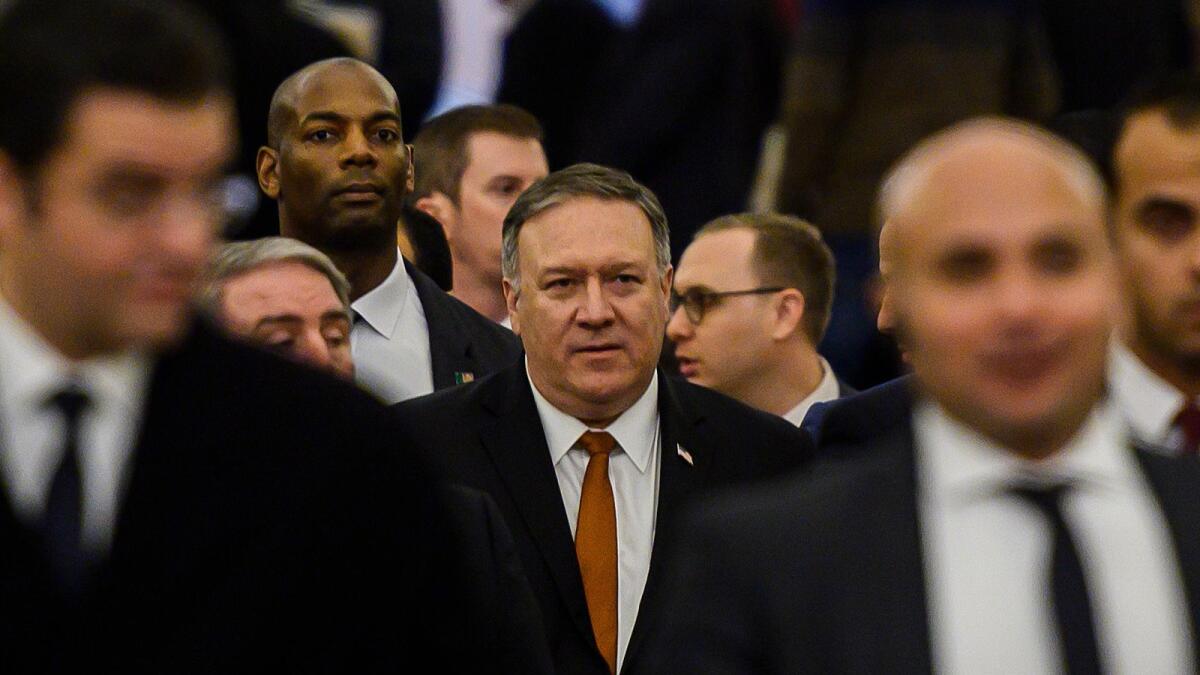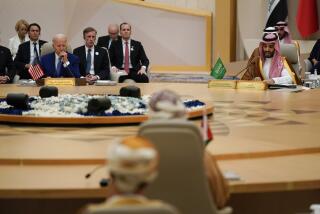Pompeo gives a speech in Cairo and takes aim at Obama and Iran

- Share via
Reporting from Cairo — Secretary of State Michael R. Pompeo used a keynote address in the Egyptian capital Thursday to take aim at two favorite targets — Iran and former President Obama — as he sought to reassure Middle East allies of Washington’s commitment to the region.
“In just 24 months, the United States under President Trump has reasserted its traditional role as a force for good in this region, because we’ve learned from our mistakes,” Pompeo said in an address at Cairo’s American University.
“We have rediscovered our voice. We have rebuilt our relationships.”
Pompeo is on a nine-nation swing through the Middle East and the Persian Gulf to allay allies’ concerns after Trump abruptly announced the withdrawal of U.S. troops from Syria.
Many in the region fear the U.S. disengagement will bolster Iran, which has gained territory in Syria in what enemies like Israel and Saudi Arabia see as a growing threat.
Ahead of the speech, Pompeo met with Egyptian President Abdel Fattah Sisi and Foreign Minister Sameh Shoukry, whom he praised as firm partners in fighting terrorism.
Egypt is one of the top recipients of U.S. aid, including the sale of tons of armaments. Under Sisi, however, Egypt also has one of the most egregious human rights records in the region, with hundreds of dissidents killed and thousands jailed.
Speaking briefly to reporters, Pompeo sidestepped the issue of human rights, saying he had raised the “panoply” of concerns but declined to criticize the Egyptian government or enter into specifics.
Sisi is one of the autocratic strongmen for whom Trump has expressed unabashed admiration.
Since Trump last year withdrew the United States from the landmark Iran nuclear deal, the administration has not hesitated to portray the Islamic Republic as the world’s most evil proponent of terrorism. Pompeo on Thursday said Iran was the “greatest threat of all in the Middle East.”
By giving the speech in Cairo almost exactly 10 years after Obama’s groundbreaking and well-received address in the same city, Pompeo invited comparison between the two administrations’ very different approaches to the Muslim world.
Obama on June 4, 2009, invoked the Koran and extolled the virtues of Islam and the potential for relations between the faith and America. Pompeo took a more aggressive tone, and he suggested Obama was weak in countering the threat of radical Islam.
“Remember: It was here, in this very city, another American stood before you,” Pompeo said. “He told you that radical Islamist terrorism doesn’t stem from ideology. He told you [the terrorist attacks of] 9/11 led my country to abandon its ideals, particularly in the Middle East.
“He told you that the United States and the Muslim world needed ‘a new beginning,’” Pompeo said. “And the results of these misjudgments were dire.”
The Trump administration repeatedly blames Obama for the rise of Islamic State militants in part because of the decision to withdraw most troops from Iraq. And Trump and his advisors claim credit for combating the group and dismantling most of the so-called caliphate it built across large swaths of Iraq and Syria. However, the success in fighting Islamic State has come in the final phase of a military campaign launched under Obama.
“We grossly underestimated the tenacity and viciousness of radical Islamism,” Pompeo said.
“The age of self-inflicted American shame is over, and so are the policies that produced so much needless suffering,” he added.
He said that when the United States withdraws, “chaos follows.” And yet that is what the Trump administration is planning for Syria.
Pompeo contended that the withdrawal from Syria will go ahead, despite numerous contradictions over the plans. Trump initially said it would be immediate, which alarmed his advisors and drove Secretary of Defense James N. Mattis to resign. Trump’s national security advisor, John Bolton, then said the pullout would not happen while pockets of Islamic State remain and without a guarantee from Turkey that it won’t attack U.S.-backed Kurdish fighters in Syria.
Meanwhile, the Pentagon continues to plan for a withdrawal within 120 days.
“There is no contradiction whatsoever,” Pompeo said, adding the reports were “made up by the media.”
For more on international affairs, follow @TracyKWilkinson on Twitter
More to Read
Sign up for Essential California
The most important California stories and recommendations in your inbox every morning.
You may occasionally receive promotional content from the Los Angeles Times.











